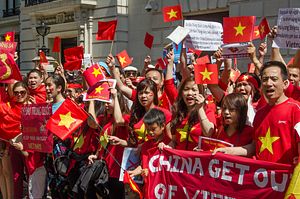Chinese State Councilor Yang Jiechi was in Vietnam on Monday for a meeting with Vietnamese Deputy Prime Minister and Foreign Minister Pham Binh Minh. Their talks were held under the framework of the China-Vietnam Steering Committee on Cooperation, signaling a return to normalcy after maritime tensions earlier this year caused a rift between Beijing and Hanoi.
The last time Yang was in Vietnam, also for a meeting of the China-Vietnam Steering Committee on Cooperation, it was June 2014, and the two countries were embroiled in a testy standoff over the placement of a Chinese oil rig in waters claimed by Vietnam as part of its exclusive economic zone (EEZ). At that meeting, both sides dug in on their respective positions – China maintained that its oil rig was operating in uncontested waters and being unduly harassed by Vietnamese vessels and Vietnam that the oil rig was a violation of Vietnam’s EEZ and that Chinese ships in the area were ramming Vietnamese vessels.
Since then, tensions have eased markedly. China withdrew its oil rig a month ahead of schedule, in July rather than August. At the end of August, Vietnamese Politburo member Le Hong Anh visited China in an ice-breaking trip meant to solidify camaraderie between the Communist Party of Vietnam and the Chinese Communist Party.
More recently, as Carl Thayer covered for The Diplomat, Vietnamese Defense Minister General Phung Quang Thanh visited Beijing in mid-October. “The importance of this visit cannot be overstated,” Thayer wrote, noting that communication between the Chinese and Vietnamese militaries is crucial for avoiding miscalculations and escalation that could led to a a minor incident ballooning to become a major crisis. During Thanh’s visit to Beijing, China and Vietnam signed a memorandum of understanding on establishing a direct communication line between their respective defense ministries, a hotline that could prove invaluable in future spats.
Yang’s visit to Vietnam this week built on this positive momentum. At a press conference before Yang’s departure for Hanoi, Foreign Ministry spokesperson Hua Chunying acknowledged that the “Sino-Vietnamese relationship has been beset with temporary problems since the beginning of this year.” Hua said relations “starting picking up” in August, when Anh visited Beijing. “China is willing to … keep improving and developing the comprehensive strategic partnership of cooperation between China and Vietnam,” Hua said.
Yang’s trip to Vietnam built on the idea that China-Vietnam relations are still recovering from the oil rig crisis. According to Xinhua, Yang said that China-Vietnam relations are in a “crucial period.” Both Yang and Minh reiterated their governments’ commitments to keeping China-Vietnam relations on the right track.
To do this, both sides agreed to “control and manage their maritime differences,” Xinhua reported, with both China and Vietnam promising to “avoid taking any actions that might complicate and aggravate the disputes.” They also agreed to “properly handle maritime issues” while seeking a lasting solution through a bilateral government mechanism dealing with border negotiations.
While Yang’s visit represented public goodwill, it really didn’t offer any new solutions for the maritime disputes that present the biggest threat to China-Vietnam ties. Both sides pledged to “exercise self-restraint in the conduct of activities that would complicate or escalate disputes” in the 2002 joint “Declaration on the Conduct of Parties in the South China Sea” signed by ASEAN and China. That did nothing to prevent the oil rig crisis in 2014.
Likewise, the bilateral border negotiation framework is nothing new. China and Vietnam signed an Agreement on the Basic Principles Guiding the Resolution of Maritime Issues in October 2011, with both sides agreeing to negotiate over maritime issues “in a gradual manner, with easy things coming first.” Hanoi and Beijing reaffirmed their commitment to using the border negotiation mechanism to address maritime issues in December 2013, shortly after Chinese Premier Li Keqiang’s visit to Vietnam. Those agreements did nothing to calm the oil rig crisis in May 2014.
The damage to China-Vietnam relations this summer was not a result of a lack of political agreements or communication mechanisms. Instead, ties were damaged because, when push comes to shove, both sides value staking out their territorial claims over maintaining a stable bilateral relationship. China-Vietnam relations will only be truly stable when this political calculus changes. Otherwise, the relationship between these neighbors will remain highly vulnerable to territorial spats.

































